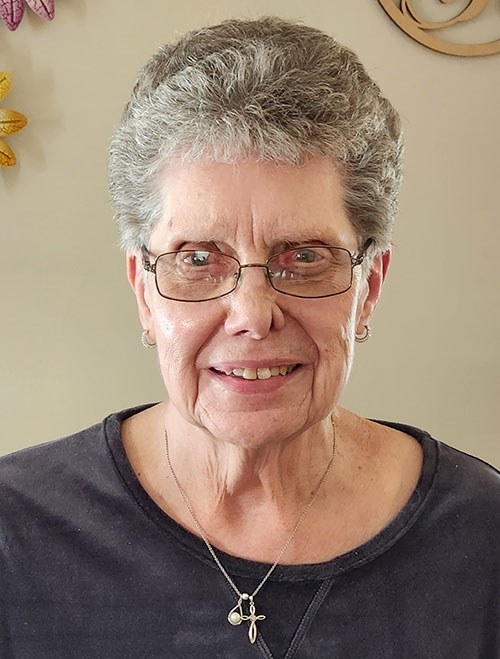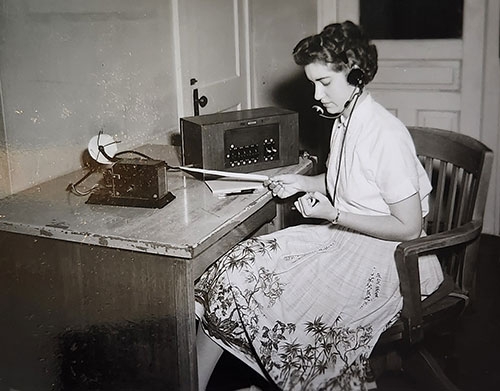You are here
Home ›After nearly 70 years in the local workforce, Jane Tepesch reflects on her start as a telephone operator, other rewarding careers as she retires

Jane Tepesch ...

Telephone transition ... Pictured above is Jane Buntrock (now Jane Tepesch) working through the transition from switchboard telephone operation to dial telephones during her days working for Northwestern Bell early in her nearly 70-year working career. This photo appeared with a newspaper story about residents testing their new dial telephone with a photo caption reading, “Jane Buntrock, above, is one of the operators who will call you and ask you to dial a special number. If you make an error, it will be shown on the tape so she can explain it to you and help you dial correctly”.
by Brianne Grimstad
From the time that she was a young girl, Jane (Buntrock) Tepesch says she knew she wanted to be a telephone operator. “When you saw the pictures in the magazines, they looked so kind and helpful,” she says of what inspired her to follow her dreams.
When Jane was a teenager, Marian (Moyer) Smedsrud worked as an operator and one Saturday she brought Jane with her to work. Jane said she sat in a chair with a headset on and observed how the operators worked the switchboards. “Back then, the head sets covered the ears entirely,” Jane explained.
When asked if she could hear what was being said in her headsets, Jane couldn’t. “I had the holes turned to the outside,” Jane laughed. She had been wearing the headset wrong.
In June of 1954, Jane went to work for Northwestern Bell at the age of 18 years old. The office was located above the Chevrolet Garage at the time, on the second story.
Working as an operator was a well-paying job for a woman at that time. Being an operator wasn’t as simple as just plugging something into the switchboard. Operators had to learn the different relays to send calls when the calling party wanted to make a long distance or over-seas calls. Calls from payphones had to be monitored, and operators had to listen to the sounds that came from the coins to determine the denomination of the coin (nickel, dime or quarter). “Each coin made a different sound,” Jane explained.
Operators would also have to make up handwritten tickets to determine charges on calls. She still has a card with the different shifts - called tricks but Jane doesn’t know why - and the pay rates. Over-night operators got what could be comparable to a shift differential pay. There was a cot available for the over-night operator to use. Working on the holidays would get you double pay.
In 1956, Jane spent some time working in the business office. The change collected from the payphones was brought to the business office in containers and they had to count it all by hand. At that time, Evans Refrigeration located in downtown Waukon took payments for the phone company, so Jane would also have to collect the payments from them. The phone books that were sent out to customers were hand-wrapped in brown paper before being mailed out to customers. After working in the business office, Jane was promoted to Assistant Chief Operator and eventually to Chief Operator.
Telephone operators also acted as an early form of emergency dispatcher. Jane explained that there were lights located on top of the Waukon State Bank building and City Hall, and there was a switch located in the telephone office for operators to turn those on if someone called in with an emergency.
When they saw the light was activated, the police would then call to the operators and find out who had called and where they needed to go. There was a separate button to operate the fire sirens, and the firemen would then also call in to find out what was happening and where to go.
“Of course, everyone else would call in too,” Jane said.
When the general public noticed the lights or heard the sirens, they were curious. She said they figured out a system where they would put a dab of red paint over the lights on the board that corresponded with the lines they knew were coming from emergency personnel so they knew what calls to take first to get the information to the proper parties. “You really felt like you were doing a service,” Jane said.
In this age of cell phones, the Internet and all of the technology and information available to everyone at their fingertips, and in a matter of seconds, it’s easy to forget that at one time the switchboard operators were the ones who connected people to the outside world, local or long distance.
The general public was also appreciative of the work put in by the ladies at the telephone company. While Jane didn’t often work at night, the night operators would receive hand-dipped ice cream from the girls who worked at the Soda Grill in downtown Waukon as a treat, often delivered by the local policeman on duty. “We were well treated by the public,” Jane said.
In 1960, the Waukon office went to dial, thus eliminating the need for switchboard operators. Jane was there and remembered the eerie feeling of the lights being shut off. Someone had always been in that building, 24 hours a day. That was the first time that she was aware the lights had ever been shut off.
Jane then went to work in the office of the Repair Department for Northwestern Bell. With the advancements in technology, which Jane said happened very fast, there were a few times the need for her position within the phone company was no longer needed. “I lost my job a few times due to automation,” Jane explained.
Jane says she never has worked a job she didn’t like, but her time with the telephone company holds a very special place in her heart. Starting in 2004, operators of the Northwestern Bell company began getting together twice a year for a luncheon in May and November. Jane has a scrap book filled with pictures from those lunches. The Covid-19 pandemic pretty much put an end to the lunches, with the last one being in November 2020.
Over the years, the group had dwindled from 18 or so to just four. The ladies were encouraged to write down their memories of working at the switchboard and a binder with those stories is available for the public to read in the Old Courthouse Museum in Waukon.
In addition to Northwestern Bell, Jane worked in the Allamakee County Courthouse, as secretary for Arlene Ingles and Joan Feller in the Homemaker Health Aid Agency and the County Nurse departments. She also worked as a secretary for Henry Feller at KanGlass. His business was located near the present-day Waukon Golf Course, where Cow Pool was located.
In 1984, Jane went to work as a teller for MidAmerica Savings Bank. She worked there until the bank closed in 1990. Her manager was Lois Votsmier, and she worked with Kelly (Kolsrud) Mahr until the bank closed.
In March of 1990, Jane went to work for Jim and Sue Bieber at Bieber Insurance and Real Estate. She was an administrative assistant in their office. After spending 33 years with them, she decided it was time to retire. While she was there, Jane worked with Sue Torkelson, Taylor Grangaard, McKayla (Hess) Fish and Ricki Greilinger.
Jane said she decided to stay in the Waukon area while she worked at these various places because this is her home. “Waukon is my hometown and it has always meant something to me,” she explained.
When she wasn’t working, Jane kept busy with her family. She and her husband Bill, also from Waukon, were married in 1966. They did live in Decorah for a couple of years, but moved back to Waukon in 1969. The couple has three daughters: Dawn, Tracey and Tricia. Jane noted that she and her husband worked hard to send their daughters to private colleges, and now they all have lives and families of their own.
Jane has been an active fundraiser. She served as the president of the St. Patrick School Board. “We were a very active board,” Jane reminisced. They brought back the church bazaar and also brought a donkey baseball game to town. Jane also was instrumental in getting the Adopt-A-Student program going at St. Pats. She started Bingo at St. Pats and ran it for four years. She has also taught Sunday school at the Methodist Church and CCD at St. Patrick’s.
Jane has also been active in helping with elections, working for years at the polls during elections, and she is still active on the Absentee Board. In addition to all of that, she also gave piano lessons for many years. Music has been part of her life for a long time.
When she was 10 years old, she became the organist for the French Creek Methodist Church. “People might not believe that” she said. “When I first started it was a piano, but then we upgraded to an electric organ.” She has also played for weddings in the area over the years.
In her spare time, Jane enjoys playing Mexican Train dominoes, a game that she was introduced to by a cousin. Jane has enjoyed sharing that game with her friends as well. She also enjoys reading and sharing the books in The Godwink Series by SQuire Rushnell. Jane also looks forward to answering her daily trivia questions.
Jane will be turning 88 this year and she is looking forward to enjoying the retirement life. She plans to do some organizing and completing projects around her house. She has helped out at Paws Up in Waukon, owned by her daughter Tracey, and plans to continue to help out with special events at the store. Her cat, Benji, will enjoy being able to spend some extra time with Jane as well.
A retirement celebration had been planned for Jane January 13, but the winter storm caused for that to be postponed. Jane noted that they plan to try again, but are going to wait for nicer weather, probably sometime in the spring. In the meantime, she has enjoyed receiving cards and letters, some from former telephone company co-workers and containing memories of working there.

